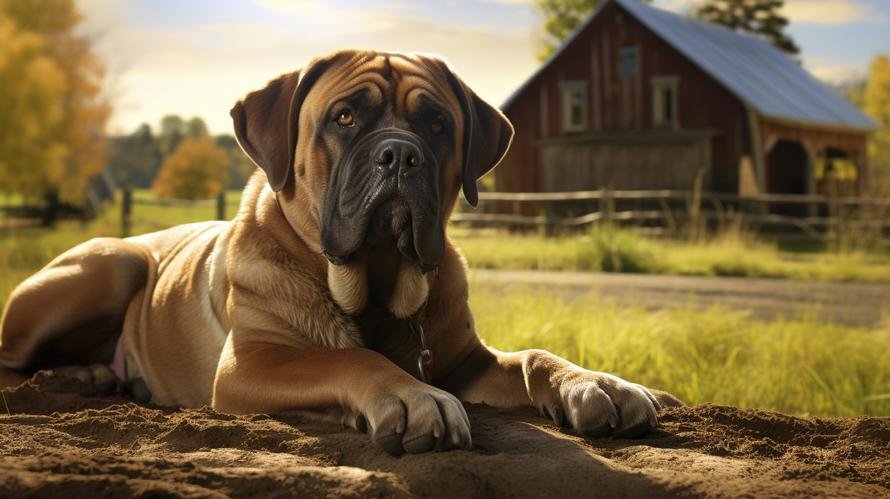Did you know that the Mastiff breed actually dates back as far as 3000 B.C.? It’s mentioned in ancient Eastern and Western literature, often being recognized for their power and strength. Yes, these gentle giants have a history that is as rich and complex as their health. Famous for their formidable size and endearing nature, Mastiffs are a fascinating breed to pet lovers worldwide. But, is this breed a healthy one? Well, the answer is not as simple as you might think.
The Mastiffs, also known as the Old English Mastiffs, possess a unique combination of grandeur and good nature. What’s truly endearing about these colossal creatures is their steady temperament and heartwarming intimacy with their human companions. Despite their intimidating size, Mastiffs are often referred to as “gentle giants.”
Having a Mastiff as your loyal companion is like adding an impressive, protective, and lovable member to your home. However, like any living being, these dogs come with a set of health issues due to their size, genetic traits, and other factors. So, owning one requires a robust and informed care strategy which we are about to unveil.
First off, let’s understand the average lifespan of a Mastiff: it ranges between 6 – 10 years. This shorter lifespan, compared to smaller dog breeds, is primarily due to this breed’s larger size. It’s a general trait observed in large dog breeds, unfortunately.
One of the most significant health concerns that Mastiffs face is Obesity. Their big appetite and low energy expenditure often make them prone to gaining unnecessary weight. We all love pampering our pets with treats and extra food, but with Mastiffs, you need to pay extra caution. Obesity not only aggravates joint problems but can also lead to other health issues like diabetes, heart disease, and various types of cancer.
Adding regular exercise and a well-balanced diet to your Mastiff’s routine would go a long way in preventing obesity and promoting their overall health. Ensuring your Mastiff has a balanced and proper diet will aid in maintaining their calorie needs and controlling their weight.
Mastiffs are also predisposed to developing certain types of bone diseases due to their impressive size. Quick growth during puppyhood can often result in bone disorders such as Hip Dysplasia and Elbow Dysplasia. These are painful conditions that affect the joint’s mobility. Regular vet checkups will help identify and treat these conditions before they become a significant problem.
Another health issue common among Mastiffs is Gastric Dilatation-Volvulus (GDV), or more commonly known as Bloat. Bloat is a potentially fatal condition where the dog’s stomach quickly fills with gas and turns over on itself, preventing the gas from escaping. It is deemed an emergency requiring immediate medical attention. One way to aid in preventing this condition is to feed your Mastiff small, frequent meals instead of one large daily meal.
Bloating may seem threatening, but luckily it’s not a common occurrence. Just knowing the risk and understanding the preventative measure reduces the chances of this unfortunate event.
Despite the potential health issues listed above, many Mastiffs live healthy and happy lives. The key here is responsible ownership. Regular vet visits, a balanced diet, and good exercise can extend your Mastiff’s life and make it fruitful.
Mastiffs are well-known for their loyal, protective nature. They are a smart breed that loves to please their humans. Despite their large size, they tend to be incredibly gentle with children, making them an excellent choice for family pets.
Of course, the health of any dog also depends on its environment and upbringing. A Mastiff raised in a loving, well-cared-for environment where he can get ample exercise and a balanced diet is likely to be healthier and live longer than a dog who isn’t.
While this article might make owning a Mastiff seem like a lot of work, it’s essential to remember that every breed has its unique set of challenges. The value of the bond between a pet and its owner can never be overstated. Yes, they require a bit more attention to their health, but owning a Mastiff can be an incredibly rewarding experience.
There is no definitive answer to whether the Mastiff is a healthy dog breed because health depends on many different factors. However, with the proper care, regular veterinary checkups, and a lot of love, a Mastiff can be a loyal, healthy, and loving part of your family.
In conclusion, the fact remains that Mastiffs, when taken care of responsibly and lovingly, can give you moments of joy, companionship, and a sense of security that outweigh the potential health issues. It’s about knowing what to expect, being prepared, and loving them for who they are— dignified, loyal, and oh so huggable!



